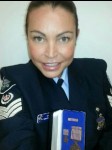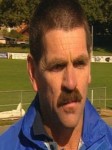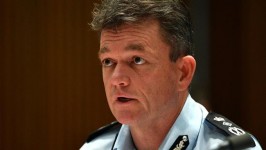Fifth tragic workplace suicide of AFP officer
- Details
- Category: Police Suicides
- Created: Wednesday, 08 July 2020 19:39
- Written by Megan Palin - news.com.au
The man, from Melbourne, reportedly took his own life with his service weapon in a Canberra motel room overnight while on a work trip in the capital.
News.com.au understands his body was discovered by a colleague.
It brings the total number of AFP officers to have died by suicide at work using their firearms since February 2017, to five.
An AFP spokesperson told news.com.au it could “confirm that a member of the AFP appears to have taken their own life”.
“A brief is now being prepared for the ACT Coroner,” the spokesperson said.
“The AFP is providing support to the member’s family and colleagues.”
The AFP didn’t respond to further questions.
The man — who news.com.au has chosen to not yet identify — was an Air Security Officer (ASO) responsible for the containment or resolution of high-risk security incidents on domestic and international flights.
According to the AFP’s website, the main purpose of an ASO is to respond to threats or attempts of hijack by terrorists or other criminals.
“ASOs are extensively trained in many disciplines including negotiation, defensive tactics, specialist firearm handling and small team techniques,” it reads.
The latest apparent suicide death by a member comes amid an ongoing cultural crisis within the AFP.
The embattled organisation has made efforts to increase mental health support following the spate of workplace suicides but has grappled to tackle the problem. In January this year, AFP Commissioner Andrew Colvin revealed the force was restricting its officers’ access to firearms, in direct response to the suicides.
“There is no one thing that will solve what is a complex problem but we have made changes to our firearms access policies,” Mr Colvin told the ABC at the time.
As part of that new policy, members are now required to provide a reason to check out their weapons while off duty. But for those dying by suicide while on-duty — the tally continues to climb.

AFP officer Sue Jones died by suicide in February 2017.Source:Facebook

Another four AFP officers have died in shockingly similar circumstances following Ms Jones’ death.Source:Facebook
RELATED: AFP’s history of ‘overreach’
RELATED: Internal investigations into whistleblowers a ‘necessary evil’
One AFP officer, who spoke to news.com.au on the condition of anonymity, described the man who died overnight as a “really good guy”.
The source said he saw his friend last week and that he had “seemed OK”.
“They need a Royal commission into what’s going on. So many members are stressed,” he said.
“In all my 20 years of policing, I have never felt so deflated by an organisation.”
The workplace suicide deaths, once unprecedented, have become a disturbingly frequent occurrence within the organisation in recent years.
AFP officer Sue Jones turned her service weapon on herself in the bathroom at the organisation’s Melbourne headquarters in February 2017.
Since Ms Jones’ death, almost 100 AFP whistleblowers have contacted news.com.au to report a severe mismanagement of widespread mental health issues and a disturbing internal bullying culture within the organisation.
Many of the past and present sworn members who came forward claimed the toxic culture had culminated in the workplace suicides and warned that more deaths were inevitable.
Among them was an agent who, following Ms Jones’ death, made a chilling prediction that has since become a reality.
“It’s like looking at a whole lot of ticking time bombs and wondering which one will go off,” he said of his colleagues. Another four AFP officers have since taken their lives at work.
An independent police advocacy spokesman, who asked not to be named, told news.com.au he was concerned officers might be trying to send a message by taking their lives in the workplace.
RELATED: AFP Commissioner’s vow
RELATED: AFP agent’s open letter
RELATED: Traumatised agent suing the AFP for huge sum

AFP agent Samantha Baglin died by suicide in December 2018.Source:Supplied

Samantha Baglin was a well-liked and respected agent.Source:Supplied
TRAGEDY IN THE WORKPLACE
In December last year, Sergeant Samantha Baglin, 44, died by suicide in the vault room at the Australian Federal Police national headquarters in Canberra.
Just six weeks earlier, Superintendent Richard Roberts also took his own life in the same place.
In November 2017, AFP member Malcolm Scott, 59, walked into the foyer of the organisation’s Melbourne headquarters and took his own life just before 9am on a Saturday.
Mr Scott’s death followed that of colleague Sue Jones, 53, a mother-of-two who died in shockingly similar circumstances in the bathroom of the same building earlier that year. Mr Scott and Ms Jones had worked on the same team within the Melbourne branch, according to colleagues who spoke to news.com.au. Both deaths were later deemed to be non-suspicious.
In March last year, the high rate of suicide deaths and mental health conditions experienced by first responders — including emergency service workers and volunteers — prompted a federal Parliament committee to launch an inquiry into the role of the Commonwealth and the states to address the issues.
The Australian National Audit Office (ANAO) also announced an audit into the AFP’s management of mental health within the organisation. It was later revealed that two-thirds of men and women in the AFP experienced potentially traumatic events at some stage in their career.
RELATED: Push for inquiry into the AFP
RELATED: AFP agents’ harrowing stories

AFP officer Malcolm Scott died by suicide.Source:Supplied

Malcolm Scott was a keen football player.Source:Facebook
The ANAO made six recommendations, which the AFP agreed to implement as part of its “new Health and Wellbeing Strategy for the organisation”.
The AFP also engaged the Phoenix Australia Centre to conduct an independent mental health review into the organisation and made 37 recommendations to be implemented over five years.
While the AFP has recently made efforts to improve its mental health support services for staff, many officers want more outside support.
Commissioner Colvin in May last year laid out the increasing workload on the force. The number of crimes involving victims, who might be children, had gone up 200 per cent, while cyber and corruption investigations were also on the rise.
“The demand side is increasing, there’s no question on that,” he said.
But police resources had not increased and this has added to pressure on the force.
In March this year, the AFP announced it had started a partnership with Lifeline, and would roll out a Road to Mental Readiness course over two years in a bid to equip officers with coping strategies and tools to encourage them to address mental health concerns earlier.
At the time, Mr Colvin said a critical element of addressing mental health in the organisation was cultural change.
“We still have a long way to go but if we keep implementing these positive initiatives with partners who are experts in the field we know we will make ground,” he told The Australianat the time.

Australian Federal Police Commissioner Andrew Colvin. Picture: AAP /Mick TsikasSource:AAP
AFP chief medical officer Katrina Sanders said the AFP’s 6641 members would be asked to use their imagination to prepare for stressful events, taught coping strategies such as how to use breathing to calm down and reduce stress, and given a self-assessment tool to consider their own mental fitness.
“Will it prevent further suicides? That’s also hard to say, we hope so,” she said in March.
“But certainly the research and the evidence around it is it does improve resilience and we know that’s critical to health protection.”
One AFP source, who spoke on the condition of anonymity, previously told news.com.au that the organisation “needs intense scrutiny that the agencies can’t cover up”.
“We have an expression in our job: TJF — this job’s f***ed,” the source said.
“Morale is in the toilet. We know we have no support and no backing from most of the management.”
AFPA president Angela Smith said the matters raised by the whistleblowers were of “significant public interest” and that members had gone public because they were “at their wits end”.
In a previous statement, an AFP spokesman said the commissioner had “made it clear that the health and wellbeing of our people is his and the organisation’s highest priority”.
Source : https://www.news.com.au/national/fifth-tragic-workplace-suicide-of-afp-officer/news-story/b1c77625cfc4964aff0421ebd614e03d
